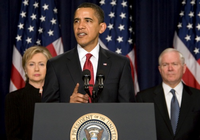The Obama administration has been transmitting a relatively clear set of signals regarding its policy toward Afghanistan ever since the strategic review was completed in December 2010: Progress has been made, but it is "fragile" and "reversible." According to this argument, since U.S. and allied efforts are showing the first green shoots in terms of being able to train and deploy Afghan security forces that could end up holding territory on their own, it would be irresponsible to change course now. The current strategy must be given sufficient time to play out, even if that does not neatly dovetail with the July 2011 deadline to begin withdrawing the first of the extra forces that were surged into the Hindu Kush a year ago. Vice President Joe Biden, during his visit to Afghanistan this week, even extended an offer to continue the American presence beyond the 2014 date that NATO has set as its deadline for turning over security in the country to the Afghans, promising that, "If the Afghan people want it, we won't leave in 2014."
This is where matters stand as of January 2011. But the current strategy presupposes that the U.S. will be able to continue to focus on Afghanistan for the foreseeable future. Biden, for one, is confident that we have passed a major milestone in Iraq, where what he called "a stable government" will increasingly be able to secure the country and resist Iranian influence, allowing for the complete departure of U.S. forces as envisioned under the 2008 Status of Forces Agreement. There is also a guarded sense of optimism that the current "pressure track" directed against Iran has slowed down its nuclear program, increased its isolation and weakened the regime.
But there are two other contingencies looming on the horizon which, if they flare up, could derail the American focus on Afghanistan.

